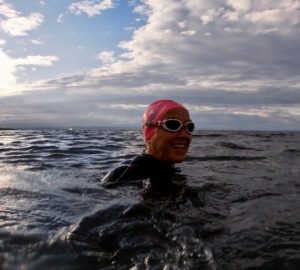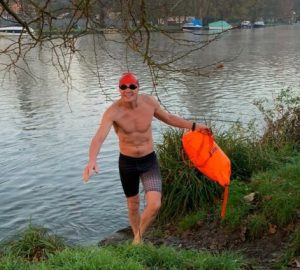Water temperature and age: are they just numbers?
Open water swimmers it seems are obsessed with water temperature, and with good reason. It makes a big difference to the ease in which you can enter the water, how you feel while swimming, how long you can stay in and how badly you get the shakes afterwards. Other factors come into play, such as the air temperature, wind speed and strength of the sun but water temperature is the one we most readily identify with and record.
But, as swimmers explore their limits, there’s a danger we treat water temperature like some people think of age: as just a number.
On 16 June this year Fergal Somerville became the fourteenth person to swim across the North Channel from Ireland to Scotland. It took him 12 hours and 21 minutes and the water temperature averaged around 10 degrees Celsius.
Ten degrees! It’s easy to say or write. The way it’s written sounds quotidian and normal. It’s just a number.
Only it isn’t. I suspect there are only a handful of people in the world who could withstand those water temperatures for that length of time. The more you learn about Somerville’s swim, the more remarkable it is.
Finding data on how quickly a body cools in water is difficult because of the number of variables but one experiment that looked at cooling rates in cadavers for the purposes of donor-organ preservation found a 70 kg donor equivalent cooled from 37 degrees Celsius (normal body temperature) to 15 degrees within six hours in a cold room at 4 degrees. Another study suggests a body cools two to three times faster in water than in air (faster if the water is moving) because of water’s greater heat conductivity. Wikipedia says immersion in water of 10 degrees can lead to death from hypothermia in as little as one hour. Cold water is not something to treat lightly.
All Somerville had to combat the cold was a pair of trunks, a swimming cap, a thin layer of grease (which was more to prevent chafing than to keep out the cold) and his ability to generate heat through physical work.
Here’s his description of what happened two hours into the swim:
“I started to feel two pressure points in my back; each about the size of an egg. I knew immediately that this was my kidneys getting cold. It is bad news when you can feel your kidneys getting cold. It means that the cold is getting a grip on you. And cold rarely lets go. I had, to this point, ignored the fact that my arms and legs were very cold. I could ignore it no longer.”
Fergal Somerville
Fergal Somerville – feeling the pain
Somerville is an experienced cold water swimmer who knows how his body responds. At this point he estimated he had about 30 minutes before he’d succumb to hypothermia and have to be pulled from the water. The only thing he could do was to swim faster and force his muscles to generate more heat. It took about 10 minutes of hard work for the pain in his kidneys to subside but he knew that wasn’t enough and he had to keep on pushing hard, using up valuable reserves of energy.
About seven hours into the swim Somerville began to feel sleepy. He started to swim with his eyes closed for six or seven strokes at a time. He wanted nothing more than to climb onto the boat and snuggle into a warm sleeping bag but again he told himself to speed up and increase his work rate. The water temperature at this point had dropped to 9.1 degrees.
It was a good thing he did. Only after the swim did he appreciate that feeling sleepy was a symptom of hypothermia and his body shutting down. The sleepiness passed as he managed to generate some heat but he had to keep battling exhaustion and cold for another five hours until he touched land in Scotland.
Somerville is a humble man and doesn’t boast loudly of his achievement. Speaking after the swim, however, he said, “I completed the North Channel because of the cold water acclimatisation training I did. I ploughed through a lot of miles in the pool every week and swam in Dublin Bay every weekend through the winter for up to 45 minutes at its lowest temperatures (the coldest for 62 years). I swam an Ice Mile in February in 3.5 degree water. I worry that people will do a Christmas Day dip, think they’re cold water swimmers, take on something challenging without proper preparation and do themselves great harm.”
No, water temperature is definitely not just a number, as the inside story of Somerville’s swim shows. But, at 50 years young, perhaps he also demonstrates that age is.






